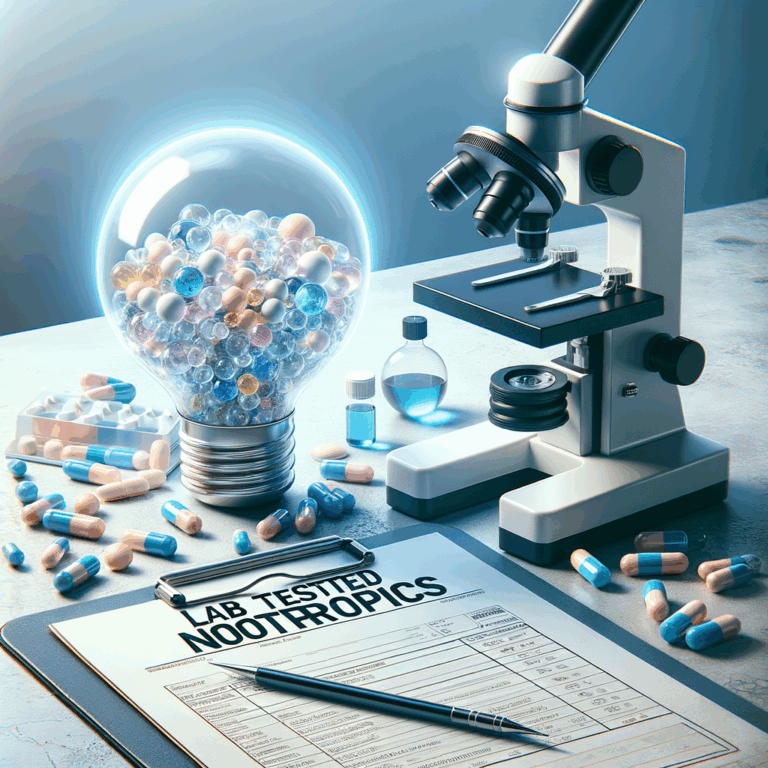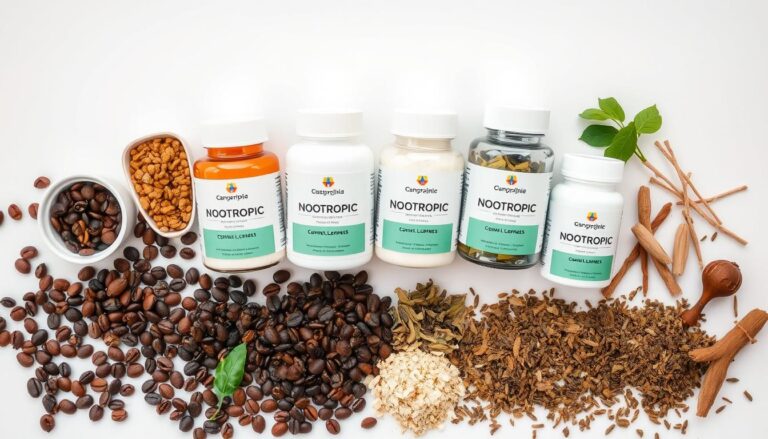- Understanding Nootropics: The Memory Boosters You Need
- What Are Nootropics?
- How Do Nootropics Work?
- Benefits of Nootropics for Memory
- Improved Memory Retention
- Enhanced Focus and Attention
- Increased Mental Energy
- Types of Nootropics for Memory
- Choosing the Right Nootropic
- How to Use Nootropics Safely
- Combining Nootropics: The Stack Approach
- Recommended Nootropics for Memory
- Side Effects and Risks
- Nootropics in the Long Term
- Frequently Asked Questions (FAQs)
- Final Thoughts
- References
Understanding Nootropics: The Memory Boosters You Need
In an ever-competitive world, the quest for sharper focus and improved memory is universal. Nootropics, often referred to as smart drugs or cognitive enhancers, have become a hot topic in personal growth and wellness circles. These substances can enhance cognitive functions and improve memory. Here, we’ll explore what nootropics for memory are, how they work, and the benefits they offer.
What Are Nootropics?
Nootropics are compounds that boost cognitive abilities like memory, creativity, and motivation. Their primary objective is to enhance the brain’s efficiency. While some nootropics are natural and derived from plants, others are synthetic compounds.
The history of nootropics dates back to the 1960s when a Romanian chemist, Dr. Corneliu E. Giurgea, coined the term. He sought to develop medications that could improve memory without side effects. Since then, nootropics have evolved, encompassing a variety of substances.
How Do Nootropics Work?
Nootropics influence neurotransmitters and enhance blood flow to the brain. They promote the production of key brain chemicals like serotonin, dopamine, and norepinephrine.
When brain chemicals are in balance, cognitive functions improve. Memory recall becomes easier, and focus sharpens. Furthermore, some nootropics protect the brain from degeneration, supporting long-term brain health.
Benefits of Nootropics for Memory
Improved Memory Retention
One of the primary benefits of nootropics is improved memory retention. These substances can enhance your ability to quickly learn and recall information. With the right nootropics, you may find it easier to absorb knowledge, whether studying for exams or attending meetings.
Enhanced Focus and Attention
Many individuals struggling with distractions can benefit from nootropics. These substances help maintain focus, making tasks feel more manageable. By fostering a clear and alert mind, nootropics enable you to perform at your best.
Increased Mental Energy
Feeling sluggish during the day? Nootropics can help with that, too. They can increase mental energy levels and combat fatigue. This boost allows you to tackle tasks more efficiently.
Types of Nootropics for Memory
Nootropics come in various forms. Here’s a breakdown of some popular categories you’ll often hear about:
1. Natural Nootropics
These are derived from plants and herbs. They tend to have fewer side effects and are widely accepted. Examples include ginkgo biloba, Bacopa monnieri, and Rhodiola rosea.
2. Racetams
This class includes familiar names like Piracetam and Aniracetam. They primarily enhance cognitive function and memory retrieval. However, they may require a doctor’s approval for optimal use.
3. Ampakines
These nootropics enhance the neuroprotective functions of the brain. They generally offer improved focus and alertness. A well-known example is Sunifiram.
4. Peptides
This newer class of nootropics includes substances like Noopept. Studies have shown potential in memory enhancement and cognitive function.
Choosing the Right Nootropic
Selecting the right nootropic can feel overwhelming, given the variety available. Consider the following factors before diving in:
– Purpose: Are you looking for focus, memory storage, or recall enhancement? Knowing your priorities helps narrow your options.
– Ingredients: Check the active ingredients in nootropic supplements. Some will resonate with your body chemistry better than others.
– Consultation: Speak with a healthcare professional before starting any new supplement, especially if you have underlying issues.
– Lifestyle Fit: Consider your routine and daily demands. Some nootropics provide quick results; others may require consistent use over time.
How to Use Nootropics Safely
Using nootropics comes with responsibilities. Here are some guidelines for safe usage:
1. Start Small: Begin with lower doses to see how your body reacts. Gradually increase your intake as needed.
2. Stay Educated: Research is critical. Keep up-to-date on studies and reviews related to your chosen nootropic.
3. Cycle Your Use: Some nootropics work best when cycled. This prevents your body from becoming tolerant and losing the desired effect.
4. Monitor Side Effects: Remain vigilant for any adverse reactions. Discontinue use if you experience negative effects and seek medical advice.
Combining Nootropics: The Stack Approach
Many users opt for nootropic stacking. This involves combining different nootropics to achieve synergistic effects.
For example, pairing Ginkgo biloba with Bacopa monnieri can enhance memory recall while improving mental clarity. However, always research compatibility and potential interactions.
Recommended Nootropics for Memory
Here’s a shortlist of nootropics that are particularly effective for memory enhancement:
| Nootropic | Benefits | Recommended Dosage |
|————————-|———————————-|————————–|
| Bacopa Monnieri | Improves memory & learning | 300-600mg daily |
| Ginkgo Biloba | Enhances blood flow to the brain | 120-240mg daily |
| Rhodiola Rosea | Boosts mental energy & focus | 200-600mg daily |
| Piracetam | Increases memory recall | 1,200-4,800mg daily |
| Noopept | Promotes cognitive function | 10-30mg daily |
Side Effects and Risks
While nootropics can be beneficial, they are not without risks. Some potential side effects include:
– Headaches: Common with certain racetams.
– Insomnia: Some nootropics can interfere with your sleep pattern.
– Digestive Issues: Upset stomach or nausea may occur in sensitive individuals.
Consulting a healthcare provider ensures you make informed choices regarding nootropics.
Nootropics in the Long Term
Long-term use of nootropics invites questions about efficacy and safety. Some studies support the benefits of natural nootropics for sustained cognitive function. Others suggest that synthetic nootropics might lead to dependency.
Nevertheless, moderation is key. Balancing nootropics with a healthy lifestyle promotes optimal results.
Frequently Asked Questions (FAQs)
1. What are nootropics?
Nootropics are substances that enhance cognitive functions like memory and focus.
2. Are nootropics safe?
Most nootropics are safe when used as directed. However, it’s wise to consult a healthcare provider.
3. How long does it take for nootropics to work?
Some effects appear within hours, while others may take weeks for noticeable changes.
4. Can I take multiple nootropics at once?
Yes, but it’s essential to research combinations for safety and effectiveness.
5. Are there any side effects?
Possible side effects range from headaches to digestive issues, depending on the nootropic.
6. Do I need a prescription for nootropics?
Some nootropics require a prescription, while others are available over-the-counter.
7. Can nootropics help with anxiety?
Certain nootropics, like Rhodiola rosea, may help manage anxiety levels.
8. What is a nootropic stack?
A stack is a combination of different nootropics used to enhance cognitive performance.
9. How should I start using nootropics?
Always begin with a low dose and gradually adjust based on your body’s response.
10. Can I use nootropics for studying?
Yes, many students use nootropics to enhance focus and memory retention during study sessions.
Final Thoughts
In today’s rapidly changing world, optimizing cognitive function becomes increasingly vital. Nootropics for memory offer a promising approach to enhance mental clarity, focus, and retention. With responsible use and an understanding of your needs, you can experience the benefits these substances provide. Always remember to consult a healthcare professional to ensure safety and efficacy.
References
1. Healthline: Nootropics
2. Examine: Nootropics
3. WebMD: Smart Drugs
4. Nootropics Up: Nootropic Stacking
5. Psychology Today: Nootropics
This comprehensive blog post outlines everything you need to know about nootropics for memory and delivers valuable insights. By being well-informed, you can explore the fascinating world of cognitive enhancement and take proactive steps toward improved mental performance.



